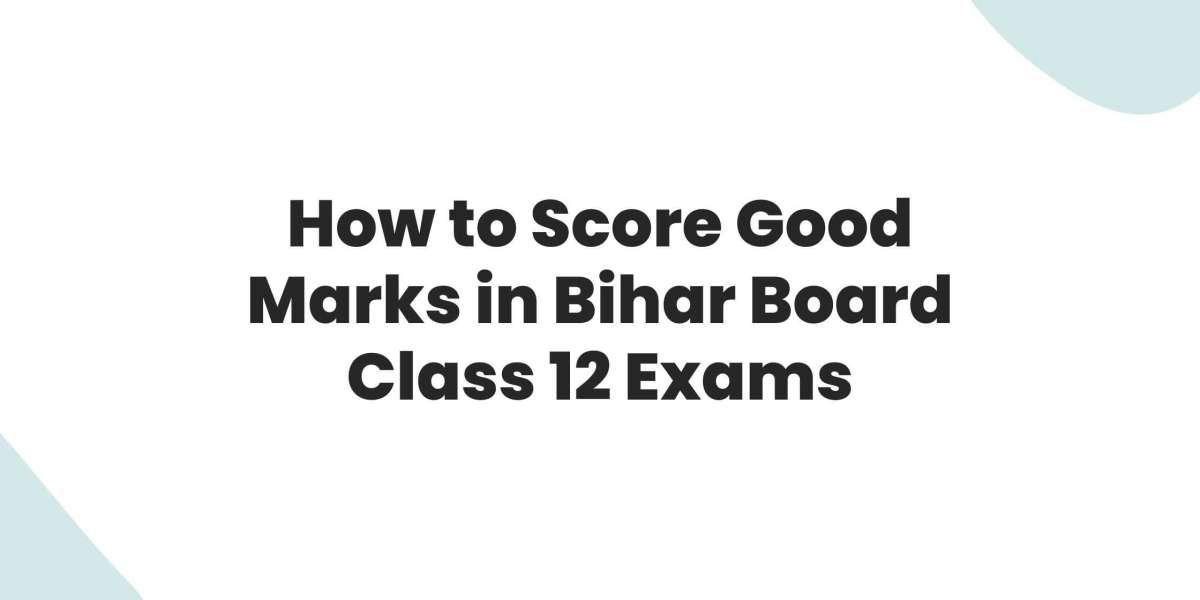Are you a student preparing for the Bihar Board Class 12 exams? Scoring good marks in these exams requires proper planning, effective study techniques, and a focused approach. In this article, we will discuss essential strategies that can help you excel in your Bihar Board Class 12 exams.
Understanding the Bihar Board
The Bihar School Examination Board (BSEB) conducts the Class 12 exams in Bihar. It is essential to have a thorough understanding of the exam pattern, syllabus, and marking scheme before starting your preparation.
Class 12 Exam Pattern
The Bihar Board Class 12 exams consist of various subjects, including Science, Commerce, and Arts. Familiarize yourself with the exam pattern, which includes the distribution of marks, question types, and time duration for each subject. This knowledge will help you plan your study schedule accordingly.
Creating a Study Schedule
A well-structured study schedule is crucial for effective exam preparation. Divide your study time among different subjects and allocate specific time slots for each topic. This approach will ensure that you cover the entire syllabus while giving equal importance to all subjects.
Creating a study schedule for the Bihar Board exams requires careful planning and time management. Here’s a step-by-step guide to help you create an effective study schedule:
- Understand the syllabus: Begin by thoroughly understanding the Bihar Board syllabus for your respective class and subjects. It will help you identify the topics you need to cover and allocate appropriate time for each.
- Set realistic goals: Break down the syllabus into manageable chunks and set specific goals for each study session. Make sure your goals are achievable within the time available.
- Determine your study time: Consider your daily routine and commitments to identify the best time slots for studying. Choose a time when you are most alert and focused, whether it’s early morning, afternoon, or evening.
- Prioritize subjects: Identify the subjects that require more attention or that you find more challenging. Allocate more study time to these subjects while ensuring you devote enough time to other subjects as well.
- Create a study timetable: Prepare a weekly study timetable that outlines your study sessions for each subject. Assign specific time slots for each subject and topic, making sure to include breaks for relaxation and rest.
- Use study techniques: Explore various study techniques like summarizing, highlighting, creating flashcards, or solving practice questions. Incorporate these techniques into your study schedule to enhance your understanding and retention of the material.
- Include regular breaks: Breaks are essential for maintaining focus and preventing burnout. Schedule short breaks of 10-15 minutes between study sessions to relax, stretch, or engage in a physical activity.
- Be flexible: While creating a schedule is important, it’s crucial to remain flexible. Adapt your schedule if you find certain topics taking longer than anticipated or if unexpected events occur. Modify your timetable accordingly to ensure you cover all the necessary material.
- Avoid distractions: Minimize distractions during your study sessions. Find a quiet and well-lit study environment, put away your phone or any other distracting devices, and inform your family members or roommates about your study schedule to minimize interruptions.
- Review and revise: Regularly review your study schedule to evaluate your progress and make necessary adjustments. Revise your timetable if you feel the need to allocate more time to certain subjects or topics.
Remember, consistency and discipline are key to achieving effective results. Stick to your study schedule as much as possible and stay motivated throughout the process. Good luck with your Bihar Board exams!
Effective Time Management
Time management plays a significant role in scoring good marks. Avoid procrastination and make the most of your study hours. Prioritize your tasks, set realistic goals, and avoid distractions during study sessions. Break down your study sessions into smaller, focused intervals for better concentration and retention.
Effective time management is crucial when preparing for the Bihar Board exams. Here are some strategies to help you manage your time effectively:
- Understand the exam schedule: Familiarize yourself with the exam dates and create a study plan that allocates sufficient time for each subject based on the exam schedule.
- Prioritize subjects and topics: Identify the subjects or topics that require more attention or that you find challenging. Allocate more study time to these areas while ensuring you cover all the necessary subjects.
- Break down the syllabus: Divide the syllabus into smaller sections or topics and allocate specific study sessions for each. This will help you focus on one area at a time and ensure comprehensive coverage.
- Create a study timetable: Prepare a study timetable that outlines your study sessions for each subject and topic. Allocate specific time slots for studying and revision, ensuring a balanced distribution of subjects throughout the week.
- Avoid procrastination: Start your study sessions promptly and avoid putting off tasks. Procrastination can lead to unnecessary stress and cramming. Begin with the most challenging subjects or topics when your mind is fresh and alert.
- Use active learning techniques: Engage in active learning techniques such as summarizing, self-quizzing, and teaching the material to reinforce understanding and retention. This approach helps optimize study time and enhances comprehension.
- Take regular breaks: Plan short breaks during your study sessions to rest and recharge. Breaks can help improve focus and prevent mental fatigue. Use this time to relax, stretch, or engage in a physical activity.
- Eliminate distractions: Minimize distractions during your study sessions. Find a quiet study environment, turn off notifications on your phone or computer, and inform your family members or roommates about your study schedule to minimize interruptions.
- Use technology wisely: Utilize technology to your advantage. Use apps or online resources that can help organize your study materials, create flashcards, or provide additional practice questions.
- Stay organized: Keep your study materials, notes, and resources organized. This will save time and prevent unnecessary stress when you need to locate specific information quickly.
- Review and revise: Set aside regular time for revision to reinforce your learning and identify areas that need further clarification. Reviewing previous topics helps in long-term retention of information.
- Take care of yourself: Ensure you get enough sleep, eat well-balanced meals, and engage in physical activity. Taking care of your overall well-being is essential for maintaining focus and optimal cognitive function.
Remember, effective time management is a skill that takes practice and discipline. By implementing these strategies and following your study schedule diligently, you can make the most of your time and perform well in the Bihar Board exams. Good luck!
Choosing the Right Study Material
Selecting the appropriate study material is essential for comprehensive learning. Refer to textbooks prescribed by the Bihar Board and additional reference books to gain a deeper understanding of the subjects. Online resources, educational websites, and video tutorials can also supplement your learning. Bihar Board Solutions can be a very helpful study material for those who want to revise lessons effectively.
Choosing the right study material is crucial for effective preparation for the Bihar Board exams. Here are some tips to help you select the appropriate study materials:
- Official textbooks: Start with the official textbooks prescribed by the Bihar Board for your respective class and subjects. These textbooks are designed to cover the entire syllabus and provide a comprehensive understanding of the topics.
- Reference books: Supplement your study with reference books that offer additional explanations, examples, and practice questions. Look for books that are recommended by teachers, subject experts, or previous successful candidates.
- Past exam papers: Obtain and study previous years’ exam papers. These papers give you a good idea of the exam pattern, types of questions asked, and the level of difficulty. Solve these papers to practice time management and assess your preparedness.
- Study guides: Consider using study guides or question banks specifically designed for the Bihar Board exams. These guides often provide concise summaries, key points, and practice questions, making them helpful resources for revision.
- Online resources: Explore online platforms, educational websites, and digital learning resources. Many websites offer free study materials, video tutorials, and interactive quizzes that can supplement your preparation. Ensure the sources are reliable and reputable.
- Coaching institute materials: If you are attending a coaching institute, utilize the study materials provided by them. These materials are often tailored to the exam syllabus and may include practice tests and sample papers.
- Collaborate with peers: Discuss with your classmates or peers who are also preparing for the Bihar Board exams. They may recommend additional study materials or share notes and resources they find helpful. Collaborative learning can enrich your understanding.
- Online forums and communities: Participate in online forums or communities dedicated to Bihar Board exam preparation. Engaging with fellow students, teachers, or experts can provide valuable insights, study tips, and recommended materials.
- Check for updates: Stay updated with any changes or revisions in the Bihar Board syllabus or exam pattern. Visit the official Bihar Board website or consult your teachers to ensure you are using the most recent study materials.
- Personal learning style: Consider your own learning style and preferences. Some students may benefit from visual aids, while others may prefer detailed explanations. Choose study materials that align with your preferred learning style for optimal comprehension.
Remember, the quality and relevance of study materials are more important than the quantity. Focus on understanding the concepts and practicing with relevant questions. Select a balanced combination of textbooks, reference materials, and online resources that suit your needs and help you grasp the subject matter effectively.
Taking Proper Notes
Taking concise and organized notes while studying is an effective way to retain information. Summarize key concepts, highlight important points, and create visual aids such as mind maps or diagrams. Review your notes regularly to reinforce your understanding of the topics.
Active Learning Techniques
Active learning techniques involve engaging with the study material actively. Instead of passively reading or memorizing, participate in activities such as group discussions, solving problems, teaching concepts to others, and practicing through practical applications. These techniques enhance understanding and long-term retention.
Practicing Previous Year Papers
Solving previous year papers is crucial for familiarizing yourself with the exam pattern, identifying important topics, and improving time management skills. Allocate regular time for solving sample papers and simulate exam-like conditions to build confidence and reduce exam anxiety.
Seeking Help and Clarifications
Don’t hesitate to seek help from your teachers, classmates, or online forums when you face difficulties in understanding certain topics. Clear your doubts promptly to avoid any gaps in your knowledge. Forming study groups can also be beneficial as it encourages collaborative learning and peer support.
Maintaining a Healthy Lifestyle
A healthy body and mind are essential for optimal performance in exams. Maintain a balanced diet, get enough sleep, and engage in regular physical activities to stay energized and focused. Avoid excessive stress, practice relaxation techniques, and take short breaks during study sessions to rejuvenate your mind.
Strategies for Exam Preparation
Implementing effective strategies during the exam preparation phase can make a significant difference. Break down complex topics into smaller, manageable chunks. Follow a step-by-step approach, revise regularly, and allocate time for each subject based on its weightage in the exams.
Tips for the Exam Day
On the day of the exam, ensure you have all the necessary stationery, admit card, and other required documents. Reach the exam center well in advance to avoid any last-minute rush. Read the instructions carefully, manage your time wisely, and attempt the questions you are confident about first.
Dealing with Exam Anxiety
Exam anxiety is common, but it can hinder your performance. Practice deep breathing exercises, positive self-talk, and visualization techniques to calm your nerves. Remember that you have prepared well, and believe in your abilities. Focus on the present moment and tackle one question at a time.
Conclusion
Scoring good marks in the Bihar Board Class 12 exams requires a combination of effective study techniques, time management, and a focused mindset. By following the strategies mentioned in this article, you can enhance your preparation and increase your chances of achieving excellent results.
FAQs
Q1. Is it necessary to create a study schedule for exam preparation?
A1. Yes, a well-structured study schedule helps in managing time and covering the syllabus effectively.
Q2. How can I overcome exam anxiety?
A2. Practicing relaxation techniques, positive self-talk, and focusing on the present moment can help in dealing with exam anxiety.
Q3. Are previous year papers beneficial for exam preparation?
A3. Yes, solving previous year papers provides insight into the exam pattern, identifies important topics, and improves time management skills.
Q4. Can I seek help from my teachers or classmates when facing difficulties?
A4. Yes, seeking help and clarifications from teachers, classmates, or online forums is encouraged to clear doubts and enhance understanding.
Q5. How important is maintaining a healthy lifestyle during exam preparation?
A5. Maintaining a healthy lifestyle, including a balanced diet, sufficient sleep, and regular physical activity, contributes to better concentration and overall well-being during exams.








